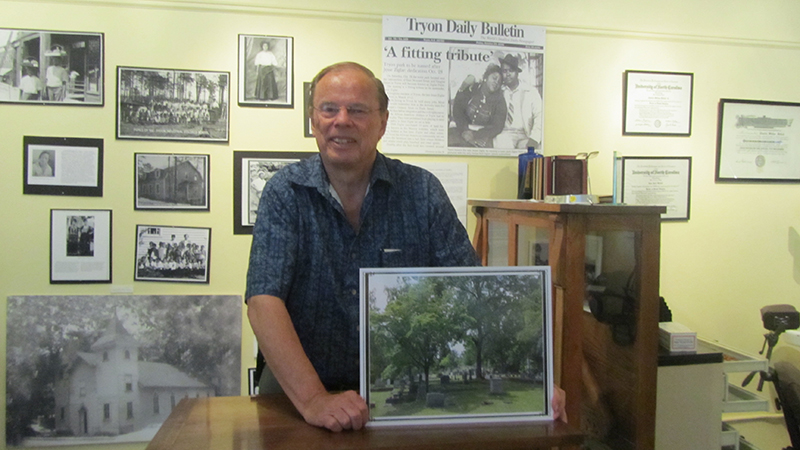A safe haven for Tryon history
Published 8:00 am Friday, June 29, 2018

- Jerry Soderquist, chair of the cemetery commission, announces the board’s intent to create the Tryon Archival Research Center during a presentation last week at the Tryon Historical Museum. The center, which will be located in town hall, is intended to collect, protect and organize documents, photos and other materials of local historic relevance. (Submitted by Jerry Soderquist)
Cemetery board looking to establish local archive center
TRYON — From the establishment of the Block House in the 1700s to the many equestrian traditions Carter Brown started in the early 20th century, the small town of Tryon has quite a large history behind it.
Now, a group of dedicated individuals are looking to ensure that large history is preserved, now and into the future.
After two years of planning and discussion, the Tryon Cemetery Commission recently announced its intent to establish the Tryon Archival Research Center, a project dedicated to the collection, protection and organization of documents, photos and other materials of historic interest to the community. The commission, with the support of Mayor Alan Peoples and other town leaders, is looking to build an archive center on the second floor of Tryon Town Hall.

The archive’s proposed location on the second floor of Tryon Town Hall will provide it with a number of benefits, including constant security, high-speed internet and standby power access, as well as a central location downtown. (Submitted by Jerry Soderquist)
Among the materials the archive will preserve are meeting minutes and records from the many nonprofits, churches and organizations that populate the Tryon area, said Jerry Soderquist, chair of the cemetery commission and one of the people spearheading the project. Local residents will also be encouraged to submit old, historically-relevant family photographs for the archive, Soderquist said.
“This town has so much history,” he said. “So many neat people have been here. We need to capture that.”
In addition to ensuring that these documents would not be discarded or languish inside a cardboard box in the corner of a basement or attic, the archive will allow people interested in researching local history or studying their genealogy to access historical materials, which will be sorted and catalogued through computer software, Soderquist said.
The commission has talked about creating a historical archive in town for the past two years, as a way to help locals learn more about the histories of those buried at the Historic Tryon Cemetery.
At first, the commission had considered acquiring the old African American Masonic Lodge building, located next to the cemetery, in order to use it to house the archive, though members later backed off the idea when they learned that the necessary repairs and renovations to the structure would be cost prohibitive, Soderquist said.
Peoples — the town’s liaison on the board —instead proposed that the members house the archive inside an empty office space in town hall, which would provide the center with a prominent location, constant police and security camera protection, high-speed internet, and standby power — at no cost to the commission.
With other town leaders providing positive feedback to the idea, the cemetery commission moved forward with the archive project, and enlisted the help of Heather South with the North Carolina’s Western Regional Archives in Asheville, who led a workshop on document preservation and organization to the members.
Last week, Soderquist shared the commission’s plans for the archive to the general public for the first time during a presentation at the Tryon Historical Museum. The idea appeared to make a splash with the more than 30 people in attendance, he said.
“Not only was there a lot of interest, people came up to me after the presentation to volunteer to help,” Soderquist said. “We may not have much for them to do at the moment, but we have their names, and we now know there is tremendous interest in what we are doing.”
Despite the enthusiasm, much work remains between now and when the archive will be up and running, the commission chair said.
First, crews will have to remodel and repaint the space inside town hall, as well as upgrade the utilities. More importantly, they will have to install climate and humidity control systems in order to ensure the documents’ safe preservation.
In addition, the commission will have to begin acquiring the historic materials themselves. Soderquist said that members would like to partner with local agencies and nonprofits in order to store their documents for them, as well as begin asking local citizens if they would be willing to turn over any historically-important records they may have.
The commission also intends to research local, state and federal grants that could possibly fund the project.
Once opened, leaders plan to allow public access to the archive: physically, by appointment, and digitally, via the internet, Soderquist said.
While their vision is still a long distance from fulfillment, seeing the positive reaction from local leaders and residents to the archive has been gratifying for the cemetery commission, especially after working on the idea for so long before its announcement, Soderquist said.
“I think we can make a meaningful contribution to the town,” he said. “I feel really good about it.”




